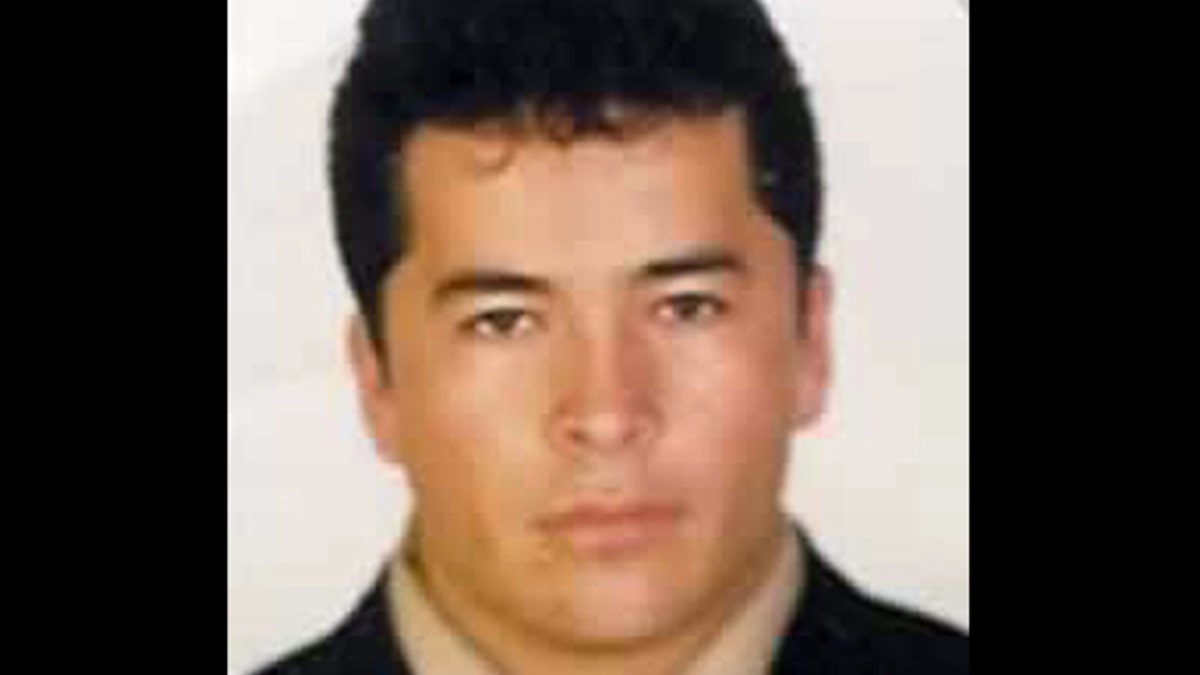
A photo of deceased Zetas chief Heriberto Lazcano Lazcano. (AP)
Mexican Naval authorities said Tuesday that fingerprints confirmed that the founder and chief commander of the ruthless Zetas drug cartel was killed yesterday in a firefight with Mexican marines.
A strange new development, however, has led to a new search for the now-deceased Zetas boss, Heriberto Lazcano.
According to accounts from two Mexican newspapers, a group of armed men broke into the funeral home where Lazcano’s body was placed and stole it.
Coahuila Attorney General Homero Ramos says two men were killed by marines Sunday outside a baseball game in the town of Progreso. He says the fingerprints of one man matched the records of Lazcano, an army special forces deserter whose brutal paramilitary tactics helped define the devastating six-year war among Mexico’s drug gangs and authorities.
Early Monday morning, Ramos said, a group of armed men raided the funeral home where the bodies were kept, and stole both corpses.
Mexican news reports claim that law enforcement authorities had already collected fingerprints, photographs and other materials needed to identify the body.
Funeral home representatives did not comment on the body theft and, in a statement released on Tuesday, Mexican Navy officials said it had turned the Zetas leader’s body over to a local prosecutor and would not make any further comments.
The Zetas are presumed to be the second most powerful drug cartel operating in Mexico, next to Joaquín “El Chapo” Guzmán’s Sinaloa Cartel. Originally the armed, paramilitary wing of the Gulf Cartel, the Zetas broke away from their former bosses in the early 2000s and quickly rose to be arguably the second most dominant drug trafficking organization in Mexico.
The group's violent tactics and flair for the dramatic -- bombings, beheadings, hanging bodies from overpasses -- have earned them a gruesome reputation throughout Mexico and has led the United States Drug Enforcement Administration (DEA) to describe them as perhaps "the most technologically advanced, sophisticated and violent of these paramilitary enforcement groups."
The Zetas now control much of the territory once under the rule of the Gulf Cartel. Practically all of Mexico's Gulf Coast is Zetas-controlled as are the states of Nuevo Leon, Coahuila and parts of Hidalgo, Puebla and Zacatecas.
The group also has a strong presence in Guatemala, where it was allegedly behind last year's massacre in the northern department of Petén that left 27 people dead, and there are reports of ties the Zetas and Italian organized crime groups.
There are rumors now that the Zetas have split into two rival factions that are battling for control of the central states of Zacatecas and San Luis Potosi, as well as for parts of Yucatan peninsula. While authorities have not confirmed the split, local media and some experts claim that there is enough evidence of internal strife within the Zetas.
"If it is true, a split would likely hinder the ongoing attack on Sinaloa groups and strongholds, as Zeta groups turned on each other," Shannon O'Neil, a Douglas Dillon Fellow for Latin America Studies at the Council of Foreign Relations, told Fox News Latino. "With this different dynamic it is unclear that the levels of violence would change - killings would continue, the 'teams' and actors may have shifted."
The death of Lazcano would be a huge bump for outgoing Mexican President Felipe Calderón, who began the country’s offensive on drug cartels when he took office in 2006. Calderón’s drug war has become increasingly unpopular in Mexico due in large part to the escalation of violence.
Approximateley 50,000 people have been killed in drug related violence since Calderón took office in 2006, although some experts argue the number is almost double that.
Incoming Mexican Presdient Enrique Peña Nieto has promised to reorganize how the drug war is fought by moving away from busting traffickers and instead focus on protecting citizens.
The ambiguity of Peña Nieto's drug war plans has fed fears that he might look the other way if cartels smuggle drugs northward without creating violence in Mexico.
“Mexico’s suffering from the violence caused by organized crime has approached Colombian proportions in just a few years,” wrote Ernesto Zedillo former Mexican President and current director of the Center for the Study of Globalization at Yale University.
The Associated Press contributed reporting to this story.
Follow us on twitter.com/foxnewslatino
Like us at facebook.com/foxnewslatino








































